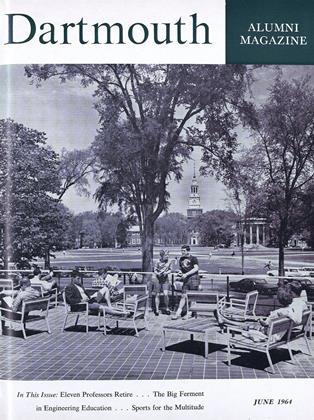Translated, withIntroductory Essays, Comments, andNotes. By Wing-tsit Chan. Indianapolis:Library of Liberal Arts, 1963. 285 pp.$1.75.
Being no Chinese scholar, I was fortunate indeed to have a visit from Professor Cheng of United College in Hong Kong when Professor Chan's translation of The Way ofLao Tzu came to me for review. The introduction and notes had intrigued me as much as the text, and I was anxious to have a more expert opinion than my own on why it all read so differently from another quite recent version. The answer is simple; that other version is elegant but an interpretation; Professor Chan's is a translation and one which enables the layman to see how the more improbable variants were rejected.
The difficulties were formidable. Written punctuation of Chinese is modern and indeed Western; oral punctuation is far from uniform over the centuries. At this level the issue is a little like the problem that faced editors of Marlowe's Dr. Faustus, who had to decide whether the mysterious letters "Oncaymaeon" were an attempt to transcribe "OEconomy" or should be split up into "On cai me on" and translated "Being and Non-Being." For in our document, if you punctuate one way, you must understand it as proclaiming "Desire Not! And Desire!"; while if you punctuate the other way, then we have a treatise on Being and Non-Being. Professor Chan makes a very persuasive case for the latter view; and this enables him to bring out the dynamic possibilities in "Non-Being," the reality in and beyond mere names and plain things.
The disciple of Tao
Learns to be unlearned, and returns to what the mutitude has missed.
lie supports sll tkinZs in tdeir natural state dut 6oss not take anx action.
Such a passage may account for the rather odd fact to which the editor rightly draws our attention, that the work is not only tolerated but approved in Mainland China today. It looks like an attack on the uppercrust book-learning of the Confucian gentleman, and a defense of collectivist naturalism!
Thus in one compact volume we have a most readable and reliable presentation of "The Way" in the light of the entire intellectual history of a remarkable and vital culture.
Professor of Philosophy
 View Full Issue
View Full Issue
More From This Issue
-
 Feature
FeatureThe Big Ferment in Engineering Education
June 1964 By DAVID ALLISON, -
 Feature
FeatureA Teacher's Real Reward
June 1964 -
 Feature
FeatureSports for the Multitude
June 1964 By LARRY GEIGER '66 -
 Article
ArticleTHE UNDERGRADUATE CHAIR
June 1964 By DAVE BOLDT '63 -
 Class Notes
Class Notes1920
June 1964 By CHARLES F. MCGOUGHRAN, JHON S. MAYER -
 Class Notes
Class Notes1930
June 1964 By WALLACE BLAKEY, ARTHUR M. BROWNING
T.S.K. SCOTT-CRAIG
-
 Books
BooksCATHOLIC VIEWPOINT ON CHURCH AND STATE.
December 1960 By T.S.K. SCOTT-CRAIG -
 Books
BooksREFLECTIONS ON THINGS AT HAND, THE NEO-CONFUCIAN ANTHOLOGY, COMPILED BY CHU HSI & LÜ-CHTEN.
NOVEMBER 1967 By T.S.K. SCOTT-CRAIG -
 Books
Books"SPEAK THAT I MAY SEE THEE!": THE RELIGIOUS SIGNIFICANCE OF LANGUAGE.
OCTOBER 1968 By T.S.K. SCOTT-CRAIG -
 Feature
FeatureMarshall T. Meyer '52 on T.S.K. Scott-Craig
NOVEMBER 1991 By T.S.K. Scott-Craig
Books
-
 Books
BooksIn Christ's Own Country
-
 Books
BooksTHE MAIN STREAM OF FRENCH LITERATURE.
December 1932 By Charles R. Bagley -
 Books
BooksBYSTANDER
MAY 1930 By E. P. K. -
 Books
BooksBlack Sheep
March 1977 By HENRY L. TERRIE JR. -
 Books
BooksWHAT AM I DOING HERE
March 1948 By Joel W. Egerer. -
 Books
BooksHEMINGWAY, THE WRITER AS ARTIST.
November 1952 By JOHN L. STEWART
T.S.K. SCOTT-CRAIG
-
 Books
BooksCATHOLIC VIEWPOINT ON CHURCH AND STATE.
December 1960 By T.S.K. SCOTT-CRAIG -
 Books
BooksREFLECTIONS ON THINGS AT HAND, THE NEO-CONFUCIAN ANTHOLOGY, COMPILED BY CHU HSI & LÜ-CHTEN.
NOVEMBER 1967 By T.S.K. SCOTT-CRAIG -
 Books
Books"SPEAK THAT I MAY SEE THEE!": THE RELIGIOUS SIGNIFICANCE OF LANGUAGE.
OCTOBER 1968 By T.S.K. SCOTT-CRAIG


